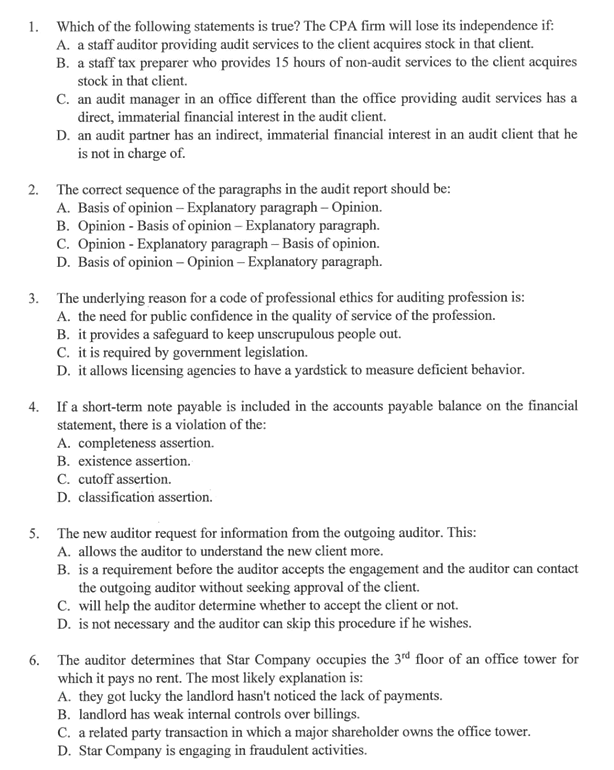Which of the following statements is true? The CPA firm will lose its independence if: A. a staff auditor providing audit services to the client acquires stock in that client. B. a staff tax preparer who provides 15 hours of non-audit services to the client acquires stock in that client. C. an audit manager in an office different than the office providing audit services has a direct, immaterial financial interest in the audit client. D. an audit partner has an indirect, immaterial financial interest in an audit client that he is not in charge of.
Which of the following statements is true? The CPA firm will lose its independence if: A. a staff auditor providing audit services to the client acquires stock in that client. B. a staff tax preparer who provides 15 hours of non-audit services to the client acquires stock in that client. C. an audit manager in an office different than the office providing audit services has a direct, immaterial financial interest in the audit client. D. an audit partner has an indirect, immaterial financial interest in an audit client that he is not in charge of.
Auditing: A Risk Based-Approach to Conducting a Quality Audit
10th Edition
ISBN:9781305080577
Author:Karla M Johnstone, Audrey A. Gramling, Larry E. Rittenberg
Publisher:Karla M Johnstone, Audrey A. Gramling, Larry E. Rittenberg
Chapter4: Professional Liability, Auditor Judgment Frameworks, And Professional Responsibilities
Section: Chapter Questions
Problem 24MCQ
Related questions
Question

Transcribed Image Text:1. Which of the following statements is true? The CPA firm will lose its independence if:
A. a staff auditor providing audit services to the client acquires stock in that client.
B. a staff tax preparer who provides 15 hours of non-audit services to the client acquires
stock in that client.
C. an audit manager in an office different than the office providing audit services has a
direct, immaterial financial interest in the audit client.
D. an audit partner has an indirect, immaterial financial interest in an audit client that he
is not in charge of.
2. The correct sequence of the paragraphs in the audit report should be:
A. Basis of opinion – Explanatory paragraph – Opinion.
B. Opinion - Basis of opinion – Explanatory paragraph.
C. Opinion - Explanatory paragraph – Basis of opinion.
D. Basis of opinion – Opinion – Explanatory paragraph.
3. The underlying reason for a code of professional ethics for auditing profession is:
A. the need for public confidence in the quality of service of the profession.
B. it provides a safeguard to keep unscrupulous people out.
C. it is required by government legislation.
D. it allows licensing agencies to have a yardstick to measure deficient behavior.
4. If a short-term note payable is included in the accounts payable balance on the financial
statement, there is a violation of the:
A. completeness assertion.
B. existence assertion.
C. cutoff assertion.
D. classification assertion.
5. The new auditor request for information from the outgoing auditor. This:
A. allows the auditor to understand the new client more.
B. is a requirement before the auditor accepts the engagement and the auditor can contact
the outgoing auditor without seeking approval of the client.
C. will help the auditor determine whether to accept the client or not.
D. is not necessary and the auditor can skip this procedure if he wishes.
6. The auditor determines that Star Company occupies the 3rd floor of an office tower for
which it pays no rent. The most likely explanation is:
A. they got lucky the landlord hasn't noticed the lack of payments.
B. landlord has weak internal controls over billings.
C. a related party transaction in which a major shareholder owns the office tower.
D. Star Company is engaging in fraudulent activities.
Expert Solution
This question has been solved!
Explore an expertly crafted, step-by-step solution for a thorough understanding of key concepts.
This is a popular solution!
Trending now
This is a popular solution!
Step by step
Solved in 2 steps

Knowledge Booster
Learn more about
Need a deep-dive on the concept behind this application? Look no further. Learn more about this topic, accounting and related others by exploring similar questions and additional content below.Recommended textbooks for you

Auditing: A Risk Based-Approach to Conducting a Q…
Accounting
ISBN:
9781305080577
Author:
Karla M Johnstone, Audrey A. Gramling, Larry E. Rittenberg
Publisher:
South-Western College Pub

Auditing: A Risk Based-Approach (MindTap Course L…
Accounting
ISBN:
9781337619455
Author:
Karla M Johnstone, Audrey A. Gramling, Larry E. Rittenberg
Publisher:
Cengage Learning

Principles of Accounting Volume 1
Accounting
ISBN:
9781947172685
Author:
OpenStax
Publisher:
OpenStax College

Auditing: A Risk Based-Approach to Conducting a Q…
Accounting
ISBN:
9781305080577
Author:
Karla M Johnstone, Audrey A. Gramling, Larry E. Rittenberg
Publisher:
South-Western College Pub

Auditing: A Risk Based-Approach (MindTap Course L…
Accounting
ISBN:
9781337619455
Author:
Karla M Johnstone, Audrey A. Gramling, Larry E. Rittenberg
Publisher:
Cengage Learning

Principles of Accounting Volume 1
Accounting
ISBN:
9781947172685
Author:
OpenStax
Publisher:
OpenStax College


Principles of Accounting Volume 2
Accounting
ISBN:
9781947172609
Author:
OpenStax
Publisher:
OpenStax College

Business/Professional Ethics Directors/Executives…
Accounting
ISBN:
9781337485913
Author:
BROOKS
Publisher:
Cengage